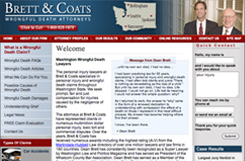Share Your Story
Click here to share your story about drunk driving.
On July 17th, 2003 at 1 a.m. while working a vehicle accident, I was struck by a drunk driver. I lost everything I had. My wife left, as 1 year of watching me have seizures and not get better was too much for her. More
Drunk Driving News
Drunk Driving Fatalities Drop to Lowest Rate since 1950
The U.S. Department of Transportation recently announced that U.S. fatalities due to drunk driving fell to a record low number in 2009, declining by 7.4% from 2008, with a 19% decrease since 2000. This represents the lowest number since 1950. More
Drug and Alcohol Courts: An Effective Alternative to Jail
Drug courts were developed in the 1980's in an effort to stop the abuse of alcohol and other drugs, and to reduce the criminal activity that typically accompanies these behaviors. More
Hold Drunk Drivers Responsible
Scientific Research
While the effects of alcohol on driving have been studied and proven for many years, it is instructive to review some of the more recent findings. While the following list is by no means exhaustive, it gives a glimpse into the results and conclusions of various scientific research.
Studies:
A Review of the Literature on the Effects of Low Doses of Alcohol on Driving-Related Skills (April 2000) – (document is available to the U.S. public through the National Technical Information Service, Springfield, Virginia 22161) - available at Low Doses of Alcohol.
Findings were reviewed from 112 published articles related to the effects on driving skills of low doses of alcohol. Significant effects were noted for behaviors related to divided attention, drowsiness, vigilance, perception, tracking, visual functions, cognitive tasks, psychomotor skills, and simple reaction time. The studies provide strong evidence that impairment of some driving-related skills begins with any departure from zero Blood Alcohol Content (BAC). When BACs of 0.080 g/dl were reached, 94% of the studies reviewed reported impairment.
Crash Risk of Alcohol Involved Driving: A Case-Control Study by R. Blomberg, R. Peck, H. Moskowitz, M. Burns, and D. Fiorentino (2005) - available at Crash Risk.
This study used a case-control design in two locations: Long Beach, California, and Fort Lauderdale, Florida. Data was collected on 2,871accidents of all severities, with 14,985 sample drivers. Significant increases in risk were observed at BACs of .04–.05, and the elevations in risk became very pronounced when BACs exceeded .10. The study data provides compelling evidence that alcohol is a major factor in traffic crash causation. Risk of accidents increases at very moderate BACs, and it increases dramatically at high BACs. The increases in risk at BACs of 0.12% and greater are dramatically higher than those previously reported. Even at a more moderate 0.08% BAC, the level that currently defines impairment for driving in most states.
Driver Characteristics and Impairment at Various BACs , by H., Moskowitz, M. Burns, D. Fiorentino, A. Smiley, & P. Zador. (2000). Report no. DOT HS 809 075, US National Highway Traffic Safety Administration, Washington DC. - available at Driver Characteristics and Impairment.
The purpose of this experiment was to determine a) the magnitude of alcohol impairment of driving skills as BACs varied from zero to 0.10% and b) whether age, gender, and drinking practice characteristics of the subjects would affect alcohol impairment in a sample of subjects who were broadly representative of the driving population.
Findings: The data obtained with 168 subjects demonstrate that alcohol impairs driving-related skills at 0.02% BAC, the lowest tested level. The magnitude of impairment increased consistently at BACs through 0.10%, the highest level tested. The major conclusion of this study is that a majority of the driving population is impaired in some important measures at BACs as low as 0.02% BAC. Although research at BACs below 0.03% has been limited, the scientific literature contains no evidence of a threshold BAC below which impairment does not occur.
If you are interested in reading more scientific research on the effect of alcohol on driving, we suggest the following sources:
Academic Journals:
Journal of Analytical Toxicology
Accident Analysis and Prevention
National Highway Traffic Safety Administration Documents:
Programs across the United States that aid motorists in the reporting of impaired drivers to law enforcement (Report No. DOT HS 810-750), Washington, DC: US National Highway Traffic Safety Administration.
The Nation’s Top Strategies to Stop Impaired Driving, Report No. DOT HS 910 712 (2009).
Evaluation of the Highway Safety Impact of Open Container Laws. Report No. DOT HS 809 426.
Fatalities and Fatality Rates in Alcohol- Impaired-Driving Crashes by State, 2007-2008. Report No. DOT HS 811 250
Fatal Crashes Involving Young Drivers, Report No. DOT HS 811 218 (2009).
Books:
Medical-Legal Aspects of Drugs 2nd Edition. Tucson, AZ: Lawyers & Judges Publishing Company.
Professional Organizations:




